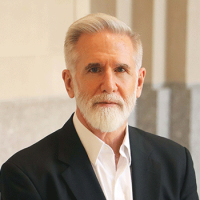Book Launch: The Terrific Rise and Terrible Fall of Ireland's Celtic Tiger: European Debt and the Future of U.S.-style Globalization
"Ireland is in the midst of a tremendous crisis," opened David J. Lynch, Senior Writer with Bloomberg News at his book launch When the Luck of the Irish Ran Out: The World's Most Resilient country and its Struggle to Rise Again. On November 9th at the Woodrow Wilson Center, Lynch painted a historical mosaic of Ireland's economic and social transformation over the past few decades. Told through five different individuals' accounts of Ireland's economic boom and bust, his story recounts Ireland's once prosperous, export-driven economy and its devolution into export-dependency, alongside a subsequent housing bubble and construction boom.
Following brief introductory remarks by Kent Hughes, Director of the Program on America and the Global Economy, Lynch began by stating that he wanted to tell a story of the Irish people and Irish identity. Characterized by a distinct cultural duality, he professed, the Irish people- "brilliant failures" as described by Oscar Wilde, have "tremendous gifts without much to show for it." Prior to the mid 1990's, Ireland had "two realities"- the "real society and a society of pretense"- an ostensibly socially conservative society in which divorce was illegal yet family dysfunction was clearly present. Lynch noted that the features of this society included a government rife with corruption and the near universal emigration of its educated labor force in search of employment opportunities.
Nearing the end of 1994, he went on, Ireland's economy was paralyzed by an 18.5% unemployment rate, a debt to GDP ratio of approximately 133%, and a huge budget deficit. Describing the economic climate as bleak, compounded by violence in Belfast and other parts of the United Kingdom's Northern Ireland, Lynch stated that Ireland's social stagnation caused it to become a "country looking backward."
Following a series of contentious economic reforms and the implementation of support from the European Union, Ireland began to grow wealthier and more stable financially. In the mid 1990's Ireland started to emerge as a model for economic prosperity. In addition to offering a well educated workforce, Ireland lowered its corporate income tax to 10%. American and other high technology companies sought to take advantage of the attractive climate for investment and an English speaking platform offering access to the European Common Market. At this point, according to Lynch, many countries around the world began to look at Ireland and ask, "What's the secret recipe?" For the next decade or so, Ireland enjoyed a reputation as an economic success story, a European tiger reminiscent of the fast growing economies in South East Asia.
Troubles in the world economy and the shift from export led growth to a dependence on a housing and construction boom created the conditions for financial disaster. Unfortunately, Ireland would soon prove the maxim that, 'all good things must come to an end.'
In 2007, Ireland, like much of the rest of the world began to suffer from the global financial crisis. In fact, Ireland's eventual real estate bubble was three times the size of the one in the US. Lynch argued that in Ireland, "[i]t was over-empowered banks and politicians" that led Ireland astray. Similar to the sub-prime crisis that infected the US, Irish bankers were making risky loans to many people who could not afford them Some Irish banks compounded the risk by coming to rely on short-term overseas borrowing to add to leverage and hence profits. The growing dependence on short-term borrowing from outside the country to support long-term domestic real estate loans, helped cement Ireland as a European tiger. Lynch noted that the Asian financial crisis was very similar to what happened in Ireland in 2007.
As a writer, Lynch concluded, it was hard for him not to notice the circularity of this story. Regarding the challenges that Ireland overcame and the setbacks it endured, he said that Ireland has become almost a different place entirely. Although the past twenty years have been some of the most economically tumultuous in Ireland's history, Lynch noted that the Irish people remain proud of their heritage and accomplishments. "It's easy to suggest that the Celtic Tiger was all just a mirage," Lynch concluded. "I don't think it was. Ireland today is a much different place than it was before the Celtic Tiger."
By: Wesley Michael Milillo
Kent Hughes: PAGE Director
Speakers

Former Director, Program on America and the Global Economy, Woodrow Wilson Center

Global economics correspondent, The Washington Post